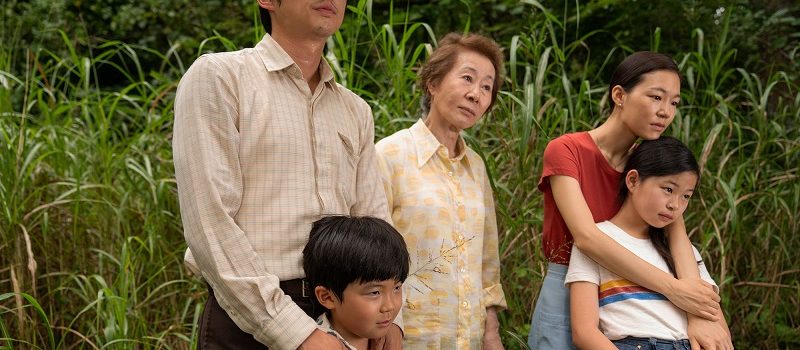The American dream is alive and well, this according to the true story at the heart of Minari.

The film follows a Korean-American family that moves to rural Arkansas with hopes of setting up a farm that will sell vegetables central to the diet of fellow Koreans who have also moved to Middle America and are searching for tastes that remind them of their culture (and to some extent, home).
Leading the charge is the family patriarch Jacob (played by Steven Yeun of Walking Dead fame), who believes that there is something about the soil in the heartland that will produce the best tasting veggies that exist. Not so sure about the entire endeavor is his wife, Monica (Yeri Han), whose first impression of the trailer he bought to call home is indifferent at best and utter horror, which is closer to the truth. They have two young children, a girl named Anne (Noel Cho), and David (Alan S. Kim) a boy—the boy would grow up to be the film’s director.

Minari is not simply a tribute to hard work and dreamers who see America as not just a place, but a promise. Writer-director Lee Isaac Chung’s film is a tender tale about family and contains tropes that are universal to stories about the inner workings and interconnectedness of family and even at its heart, what it means to be a family. More importantly, one gets the impression that not only do these elements transcend borders, but time itself. No matter the era, whether it’s the 80s (the time setting of Minari), or the 1880s, these familial factors are congruent.
Chung brilliantly interweaves the trials and tribulations that this family faces—whether it socially, economically, or integrating-driven—with a concentrated effort to paint a movie from an ancestrally connected palette. That aspect is in some ways exemplified by the arrival of Monica’s mother, Soonja (Yuh-jung Youn).

She is a hoot, on so many levels. There is a reason the South Korean actress is getting major Oscar buzz for Best Supporting Actress. Soonja immediately becomes like a glue that holds this clan together and could not have arrived at a better time. Her presence is a constant reminder of the distance the family has traveled—both literally and figuratively. The way she connects with her grandchildren could not be more moving. Timing is everything. For this family, the arrival of the mother-in-law was initially portrayed with a thin slice of dread, in the end, her landing in Arkansas from the Korean peninsula is not only everything to her daughter and her family, but to the entire Minari effort as well.
Speaking of scene-stealers… keep an eye on Kim. The young boy is extraordinary. Much is asked and required of him, as an actor and thus, his character. From making friends with kids who could not come from backgrounds more different than his own to expressing his child-centric enthusiasm for this new family adventure, David is a barometer for how the entire family is doing with this culturally shocking dive into the deep end of the American dream. He is impressionable, like all children, and he picks up on the stress of his parents. David’s not quite a fish out of water, but it’s close. As embodied by Kim, his David is our entry into this landscape and the thespian couldn’t be more malleable to whatever is required of him.

Yeun and Han are each fantastic and they do something remarkable with their performances. There is something that tethers the audience to Minari that is hard to put into words. Let’s just say that there is a connection in that what Yeun and Han achieve through their roles that has the viewer identifying with their entire existence. Who cannot relate to being in a new situation that is scary, exciting, and often times as frustrating as it is exhilarating? That’s what the pair achieve. Through them, there are pieces of each one of us and something we’ve experienced in our past that parallels what this young family faces with their present as they dream of the future.
Writer-director Chung has a touch that is pitch-perfect. On one hand, the gifted storyteller has taken what really happened to him as a child and brought it to the screen in a manner that is simultaneously engrossing, endearing, and wholeheartedly inspiring. Minari is his fourth narrative feature. Serving as both one who is charged with crafting the lines for the ensemble that will illuminate and fill out the story and the one who brings it to life is not always an easy task—even for the most seasoned filmmakers.

Chung’s work here shows a command of the material, which is no surprise. What is impressive is his ability to take a step back, as required, and simply be a vessel for delivering a story that is truly astonishing. As such, Minari is equally as compelling as it is a tale that transcends race and culture. Being able to separate himself from the subject matter for the betterment of the entire undertaking is a gift that will bode well for him for the remainder of his career.
Grade: A

